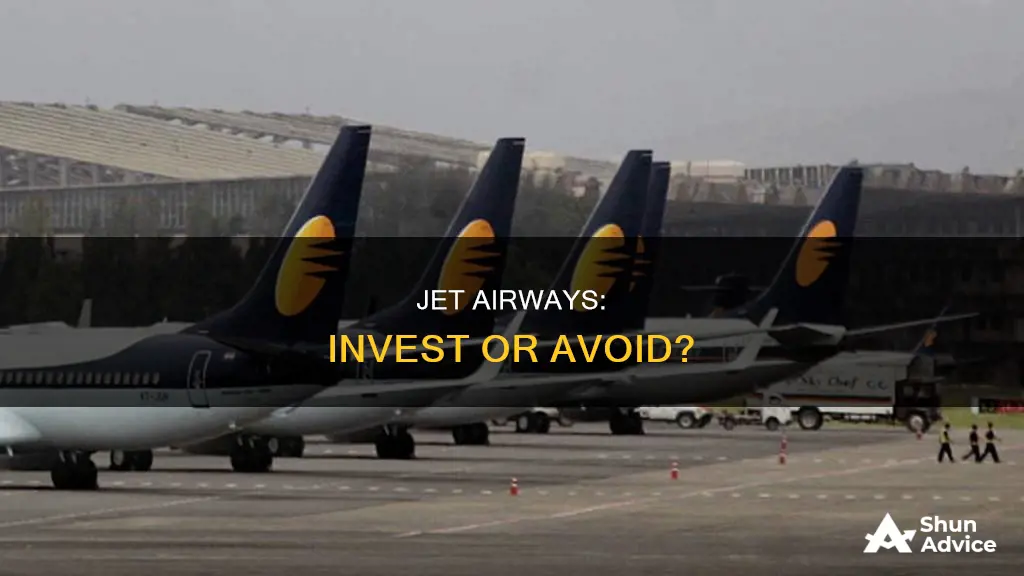
Jet Airways (India) Limited is an India-based airline company that operates flights to approximately 66 destinations across the world. The company's fleet includes 114 aircraft, including Boeing and Airbus models. Jet Airways' stock price has seen some fluctuations in recent times, with the share price currently sitting at 53.85, up 4.97% from the previous close. With the company facing financial challenges and the renewal of its flying permit only until September, it is important for investors to carefully evaluate the risks and potential returns before making any investment decisions.
What You'll Learn

Jet Airways' air operator certificate renewal
Jet Airways' Air Operator Certificate (AOC) has been renewed by the Directorate General of Civil Aviation (DGCA). The Jalan-Kalrock Consortium, the resolution applicant for the cash-strapped Jet Airways, has successfully secured the renewal.
The consortium stated that the renewal "revalidates the confidence of the Indian Aviation Regulator in the revival of Jet Airways". The consortium also expressed its gratitude to the aviation regulator, the Ministry of Civil Aviation, and all stakeholders for their faith in the revival of Jet Airways.
The renewal of the AOC paves the way for Jet Airways to resume its operations and revive its services in India. Jet Airways, launched in 1993, became synonymous with premium air travel in India before suspending operations in April 2019 due to mounting losses, debt, and dues.
The airline is now being revived under the Insolvency and Bankruptcy Code as per the National Company Law Tribunal. Jet Airways' new avatar promises to be the country's most people-focused and customer-friendly airline, with a two-class cabin configuration, including a business class cabin designed to global standards and an evolved new-generation economy class.
The Jalan-Kalrock Consortium has reaffirmed its dedication to the revival of Jet Airways and is committed to implementing a comprehensive strategy to ensure the airline's success. The consortium will continue to work closely with relevant authorities, industry partners, and stakeholders to revive Jet Airways in the coming weeks.
Century-Old Investment Strategies
You may want to see also

The Jalan-Kalrock Consortium's resolution plan
The resolution plan included a financial commitment of Rs 350 crore by the consortium, with an initial deposit of Rs 100 crore made in August 2023, followed by another tranche of Rs 100 crore paid by September 2023. The consortium also sought to adjust Rs 150 crore through the encashment of a performance bank guarantee.
The National Company Appellate Tribunal (NCLAT) directed the transfer of Jet Airways' ownership to the Jalan-Kalrock Consortium (JKC) within 90 days, with certain conditions. These included obtaining an air operator's certificate and making payments to workmen, employees, and creditors as per the resolution plan.
The civil aviation regulator, the Directorate General of Civil Aviation (DGCA), and the Ministry of Civil Aviation (MCA) were given 90 days to allot slots to the airline. The DGCA and MCA had initially stated that Jet Airways could not claim historicity for slot allocation and that slots would be allocated according to existing guidelines. However, the NCLT's decision gave the airline the opportunity to restart operations.
Who Really Knows How to Invest?
You may want to see also

Jet Airways' financial difficulties
Jet Airways' financial woes began after the acquisition of rival Air Sahara in 2007, which led to costly mistakes in fleet configuration. The airline has also been impacted by rising jet fuel prices and increasing global competition. In 2018, Jet Airways posted a loss of $185 million in the June quarter and ended the year with at least $1.2 billion in debt.
The financial difficulties continued into 2019, with the airline defaulting on debt payments in January and struggling to pay staff salaries. As a result of acute financial problems, Jet Airways was forced to ground four planes due to non-payment of lease rentals, and the airline ultimately suspended all flights in April 2019 due to a lack of funds.
Jet Airways has been seeking to restructure its debt and raise fresh funds. They have relied on Etihad, which owns a 24% stake in the airline, for financial support. However, Etihad has faced its own financial struggles, including layoffs and service reductions, casting doubt on their ability to continue bailing out Jet Airways.
The situation reached a critical point in 2023, with the arrest of Jet Airways' founder, Naresh Goyal, in connection with a money-laundering case. This marked a significant downfall for the once-successful aviation industry leader. Despite these challenges, there have been efforts to revive the airline, with the Jalan Kalrock consortium obtaining a renewal for the Airport Operator Certificate (AOC) of Jet Airways in July 2023.
Invest in Yourself: Your Greatest Asset
You may want to see also

The Indian aviation industry's outlook
The Indian aviation industry is one of the fastest-growing industries in the country. It is segmented into scheduled air transport services (domestic and international airlines), non-scheduled air transport services (charter and air taxi operators), and air cargo services. The industry has been experiencing a surge in demand, driven by a growing middle-income population and an increase in tourist traffic.
In 2024, the Indian aviation market size was estimated at 13.89 billion USD and is projected to reach 26.08 billion USD by 2030, growing at a CAGR of 11.08%. The commercial aviation segment is the largest in terms of aircraft delivered in the country, and India has become the third-largest domestic aviation market in the world. It is expected to become the third-largest air passenger market by 2024, overtaking the UK. Indian aviation contributed 5% of the GDP, creating a total of 4 million jobs, and had a USD 72 billion gross value-added contribution to GDP.
The general aviation industry in India is considered a luxury for business and private needs, and it strongly drives the country's economic growth. However, challenges such as ease of doing business, complicated tax structures, inadequate infrastructure, and complex processes for obtaining operating licenses have resulted in subdued growth in the business aviation market.
India is also a critical market for military aircraft, modernizing its aerial capabilities by procuring new aircraft and developing military aircraft indigenously. The country is the fourth-largest defence spender in the world and the second-largest in the Asia-Pacific region. In 2022, India's defence spending was USD 81.4 billion, with a proposed spending of USD 72.6 billion for the 2023-24 financial year, a 13% increase.
To meet the growing demand for air travel, the Indian government aims to develop 100 airports by 2024 under the UDAN Scheme, with a target of 1,000 UDAN routes and the development of 100 unserved and underserved airports/heliports/water aerodromes. The rise in air travel has also increased the demand for Maintenance, Repair, and Overhaul (MRO) services, with the Indian Civil Aviation MRO market anticipated to grow to 4.33 billion USD by 2025.
Overall, the Indian aviation industry is expected to witness significant growth and development in the coming years, driven by increasing demand, government initiatives, and infrastructure improvements.
Investor's Losing Bet: Why Double Down?
You may want to see also

Jet Airways' stock price performance
Jet Airways Ltd is a Mumbai-based company that provides passenger and cargo air transportation services, as well as aircraft leasing services. The company's stock price has seen some volatility in recent years, and there are several factors that potential investors should consider when evaluating the stock.
As of March 20, 2024, the stock price of Jet Airways Ltd was 57.55 on the NSE stock exchange. The company's stock symbol is "JET." While the stock price has seen some fluctuations, it is important to look at the company's financial performance and prospects to determine if it is a good investment.
One factor to consider is the company's financial health. Jet Airways has reported negative revenue and net profit figures for the past few years. For example, in 2023, the company reported a net profit of -1,002 Cr, indicating ongoing losses. Additionally, the company has a high debt-to-equity ratio, which can impact its financial stability.
Another factor to consider is the competitive landscape and industry trends. The Indian aviation industry is witnessing significant growth, with a large number of airplane purchases and investments. This could provide opportunities for Jet Airways to expand its market share and improve its financial performance. However, it is important to note that the industry is also highly competitive, with various other players offering similar services.
It is also worth noting that Jet Airways has been facing legal and regulatory issues. The company's founder, Naresh Goyal, has been involved in a money laundering case, which may impact the company's reputation and operations. These legal issues could potentially affect investor confidence and the company's ability to secure funding or partnerships.
In summary, while Jet Airways has a significant presence in the Indian aviation industry and has been working to expand its operations, potential investors should carefully consider the company's financial health, industry competition, and legal issues before making investment decisions. It is always recommended to conduct thorough research and consult with a financial advisor before investing.
Investing: A New National Pastime?
You may want to see also







